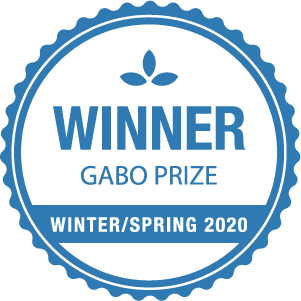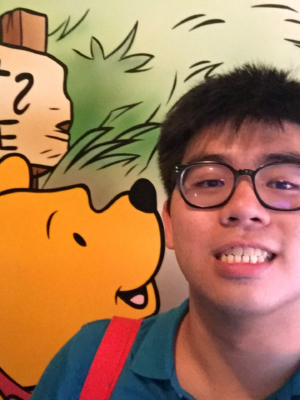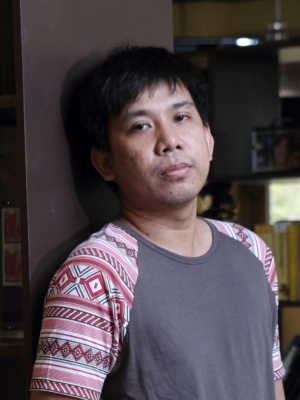Buwaya (Crocodile)
Buwaya
1.
According to the Vagrant
The wind whisks along the cold song of the night.
Bark softens with dew. I have
Been lost for a while. I circle back to the
Weathered skull of a crocodile, the hollows of its
Eyes like a nest of fireflies. I cannot place
The rotting odor, not with the flower-by-night
Hanging off its nosetip. Amazing how the universe
Honors the death of a creature
Like this. Keeping vigil with flame and perfume.
Without judgment for how it lived.
I do not wish to go home.
2.
According to the Monk
The sun is melting now. The crunch of
Leaves’ surrender underfoot,
The weight of doors and windows
Shut. The nighttime rustlings
Left to nature. Never have I yearned
To discover other sounds. Enough to hear
My own breath, the hiss of a dying
Flame, the penknife meeting wood.
Already I have carved a thousand and one
Little crocodiles. Never have I waded through marsh,
Nor do I know what the river whispers
To the thirsty but I believe in life again.
I will gasp for breath again wearing the algaed skin
Of a crocodile. I will pass the seasons in avarice
Sometimes, but mostly I will be content to
Chase the light of fireflies through the mangroves.
There will I meet the prophet. At the end of my travels
Will I be measured by what I have learned.
3.
According to the Urbanite
They crawl about in the imaginations of the
Famished whose lips gather dust here in the
City above the ones who try to climb the
Vandal yawns—God favored those who suffer.
Typhoon gathers creek is rising absent-minded
Corpses reek. Faded names and faces ironed onto
Campaign shirts, they the city-dwellers’ hopes reside in
Come as wish, amidst incessant
Prayer throats burning from the crying
Rain already, rain! some moments
Lightning pounces on the city—so easy to
Scare the ignorant. Something wraps itself in old
Tarpaulin the Congresswoman’s smile is torn where
Is room for dreams beside the hunger and cold? In the
Sleepy haze a promise bellows out the window slicing
Through the coming roar of shivering sirens—
They are here. From behind the dark and rain burns a
Pair of headlights, bloated sated crocodiles in
Procession through the daydreaming of stomachs past
Hunger, trampled shred remains dragged on in its wake.
![]()
BUWAYA
(ENRIQUE S. VILLASIS)
Ayon sa Naliligaw
Sumisibad sa hangin ang malamig na awit ng gabi.
Lumalambot sa hamog ang balat ng mga puno.
Kanina pa ako naliligaw. Natunton ko ang naagnas
Na bungo ng buwaya, mistulang pugad ng alitaptap
Ang mga hungkag nitong mata. Hindi ko mahagilap
Ang sangsang ng pagkabulok bagkus nakasabit
Ang dama de noche sa tungki ng ilong. Nakamamangha
Kung papaano parangalan ng kalikasan ang kamatayan
Ng ganitong nilalang. Pinaglalamayan ng liyab at halimuyak.
Walang panghuhusga kung papaano ito nabuhay.
Ninais kong huwag nang makauwi.
Ayon sa Monghe
Natutunaw na ang araw. Malulutong na pagsuko
Ng mga lagas na dahon sa ilalim ng mga talampakan
Ang nadidinig, pagkaraan ang mabibigat na pagpinid
Ng mga bintana’t pinto. Ipinaubaya na ang mga kaluskos
Ng gabi sa kalikasan. Matagal nang wala akong lunggati
Na makatuklas ng ibang tunog. Sapat nang pakinggan
Ang sarili kong hininga, ang pagsirit ng namamatay
Na liyab, ang pagkilala ng talas ng lanseta sa kahoy.
Isanlibo’t isang mumunting pigura ng buwaya na
Ang aking nililikha. Hindi pa ako nakakalusong sa latian,
Ni hindi ko alam kung ano ang ibinubulong ng ilog
Sa mga nauuhaw ngunit nanalig ako sa muling pagkabuhay.
Muli akong hahangos suot ang nilulumot na balat
Ng buwaya. Minsan, gugugulin ko ang mga panahon
Sa kasakiman ngunit madalas sa katahimikan habang
Sinusundan sa bakawan ang ningas ng mga alitaptap.
Doon ko matatagpuan ang propeta. Sa dulo ng paglagalag
Susukatin ako sa bawat natutuhan. Na hindi umuusbong
Ang dunong sa bukas na sugat ng pag-ibig o sa pagkaabo
Ng tagumpay kundi sa mumunting liwanag sa dilim
At sa mahabang paghahanap ng katahimikan sa sarili.
Ayon sa Tagalungsod
Gumagapang sila sa guniguni ng mga kayas ang sikmura.
Dito sa lungsod namumulaklak ang alikabok sa labi
Ng mga gutom. Sa ibabaw ng mga nangungunyapit humihikab
Ang bandal—God favored those who suffer. Malapit na
Ang unos. Bumabalikwas na ang estero at umaalingasaw
Ang mga lilimuting bangkay. Kupas na ang ngalan at mukhang
Nakaimprenta sa kanilang ipinamigay na kamiseta. Sila itong
Kanilang inaasahan. Dumarating sila sa panaginip, sa gitna
Ng kawalang dalangin, sa pagliyab ng mga lalamunang
Humihiyaw ng Umulan ka, Umulan ka na! May mga iglap
Na sagpang ang lungsod ng pangil ng nanlilisik na kidlat. Kay daling
Takutin ang mga hindi nakakabatid. May nagbabalabal ng lumang
Tarpaulin. Punit na ang ngiti ni Congresswoman. Papaano
Patatahanin ng pananaginip ang kalam at lamig? Sa gitna
Ng pag-idlip dumudungaw ang tindig ng pangangako. Hinahawi
Ang panginginig ng dumadagundong na sirenang paparating.
Narito na sila. Mula sa pagkakalukob ng ulan at dilim, sumisiklab
Ang nagniningas na mga pares ng hedlayt, hila-hila ang bangis
Ng kanilang pagdaan. Sa guniguni ng mga kinalimutan ang sikmura
Nagmamadaling prusisyon ito ng mga busog na buwaya.
Translator’s Statement
Enrique Villasis’s Buwaya is ostensibly about the many things a crocodile is: enemy to the hunter, cattle to the crocodile farmer, religious icon to the storyteller. So of course, none of the poems are really about crocodiles. What they are really about are wispy, ephemeral things—pangs!—that disappear when confronted. So Enrique draws our gaze with a little crocodile song-and-dance, allowing us to see those things more clearly out of the corner of our eye. Enrique is a fan of writing poetry in complete sentences, which makes for beautifully lyrical Tagalog. But the power of his poetry is the restraint with which he conveys a very tropical kind of restlessness: a windless, humid kind of disquiet. So I chose to adapt his work using the simplest, most straightforward English translation possible. Hopefully, my translations do his work justice.
The collection Buwaya was first published in Tagalog under the title Crocopedia. It won first place in the 2012 Don Carlos Palanca Memorial Awards for Literature.
Scott Lee Chua is a Chinese-Filipino economics student at Yale-NUS College, Singapore. In 2017, he co-authored the dark fantasy graphic novel Doorkeeper. His work has previously received the Nick Joaquin Literary Award for short fiction and the Carlos Palanca Youth Essay Award. Scott designs and plays escape rooms, and cries at superhero movies.
Translator’s photo credit: Scott Lee Chua
Enrique S. Villasis is a poet and a scriptwriter born in Milagros, Masbate, Philippines. He has won numerous national literary awards for his poetry. His first book of poems, Agua, was a finalist for the Manila Critics’ Circle National Book Awards. He is a member of the NGO Linangan sa Imahen, Retorika, at Anyo. He currently resides in Quezon City, Manila, and writes for a TV network.
Author’s photo credit: Noel Pablete







